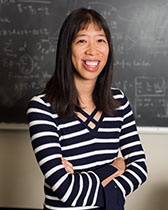Wen-fai Fong
Associate Professor

- wfong@northwestern.edu
- Website
- 1800 Sherman #8063
Wen-fai Fong utilizes observations across the electromagnetic spectrum to study explosive transients and their host galaxy environments. These transients include gamma-ray bursts, fast radio bursts, and electromagnetic counterparts to gravitational wave sources. Fong partners with her research group to characterize the host galaxies of gamma-ray bursts, mobilize the SAGUARO telescope network in Southern Arizona in pursuit of multi-messenger gravitational wave sources, and perform multi-wavelength studies of fast radio bursts to unveil their origins. She takes advantage of all wavelength regimes along the electromagnetic spectrum to piece together the origins and physics behind these explosions.
The research conducted by Fong and her group uses observations from a large variety of telescopes spanning radio, optical, near-infrared, and X-ray wavelengths on the ground and in space to explore questions such as: What are the energy sources powering astrophysical transients? What is the composition of material ejected from these sources, and what can this tell us about the birthplaces of heavy elements? What environmental conditions are required to host these transients? What can we learn from this about the formation of extreme compact objects?
Fong is the co-founder of the SAGUARO telescope network and a co-leader of the Fast and Fortunate FRB Follow-up Collaboration. She is also a member of the CHIME/FRB and CRAFT FRB collaborations. She is especially proud of her role as a mentor and teacher, and is committed to cultivating an inclusive scientific environment. She is very interested in designing courses that uplift the contributions of traditionally minoritized groups in astronomy and physics.
Research Interests
Time-domain astrophysics, transients, gamma-ray bursts, fast radio bursts, gravitational wave events
Awards and Honors
- Marc Aaronson Prize (University of Arizona, Steward Observatory) (2024)
- Lancelot M. Berkeley−New York Community Trust Prize for Meritorious Work in Astronomy (American Astronomical Society) (2024)
- AT&T Research Fellow / Professorship (Northwestern University) (2023)
- Sloan Research Fellowship (Alfred P. Sloan Foundation) (2022)
- Cottrell Scholars Award (Research Corporation for Science Advancement) (2022)
- Packard Fellowship for Science and Engineering (David & Lucile Packard Foundation) (2021)
- Faculty Early Career Development Program (CAREER) Award (National Science Foundation) (2021)
- NASA Agency Honor Award for Group Achievement (2020)
- Cecilia Payne-Gaposchkin Doctoral Dissertation Award in Astrophysics (American Physical Society) (2016)
